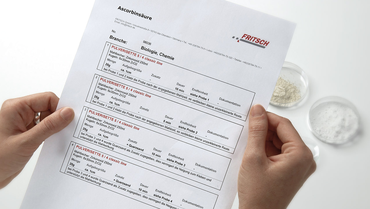Back to overview
Comminution of down feathers
On the way to allergy prophylaxis
Ducks and geese make up the majority of the animals used for feather and down production. About 80 % of down feathers are imported from East Asia. The world's largest producer of goose down is China, followed by Hungary, Ukraine and Poland. Down is a layer of fine feathers which are under the harder outer feathers of the animals. Down is a fine thermal insulator and padding used for example in jackets, bedding, pillows and sleeping bags. To prevent the development of allergies, crushed feathers are checked for harmful substances that may be present in the form of bacteria or fungi due to contamination.
For the tests in our application laboratory, the down was dried in a drying cabinet. Down whose moisture content is too high causes difficulties during grinding, as the sieves used can easily become clogged during the grinding process. The low density of the down, together with a possible swirling of the sample during the grinding process, makes the use of our high-performance cyclone with sample extraction advisable.
Comminution with the Variable Speed Rotor Mill PULVERISETTE 14 premium line
The task was to comminute feathers with the Variable Speed Rotor Mill PULVERISETTE 14 premium line.
First Test
The mill ran at the maximum speed of 18,000 rpm, which can be adjusted when the cutting rotor is used. The High-Performance cyclone with exhaust system was connected to the PULVERISETTE 14 premium line. Initially, the 2mm sieve was used as the sieve insert. The sample was fed in quickly, a batch of 50 grams of feathers (3-4 cm length) was processed.
Further procedure
Due to the large volume of the comminuted sample, the 1 litre jar was replaced by the 20 litre collection jar after a grinding time of 30 seconds. Fig. 4 documents that there was only a small amount of the sample left in the grinding chamber, which were removed by brush and vacuum. A total of 20 grams of comminuted sample was packed.
Second Test
In the second test with the Variable Speed Rotor Mill PULVERISETTE 14 premium line, the sieve shell holder was equipped with 0.5mm trapezoidal perforated sieve shells. The High-Performance cyclone with exhaust system was equipped with a sample glass of 5 litres capacity. The maximum speed of the cutting rotor 18.000 rpm was set. 50 grams of feathers (3-4 cm length) were prepared. The sample was fed at a uniformly fast rate. Thus, the entire sample quantity could be comminuted and collected in the 5-litre sample glass. The bypass of the dust exhaust system was open during the grinding process. The throughput was 38 grams of sample material.
Results
In conclusion
The Variable Speed Rotor Mill PULVERISETTE 14 premium line with the cutting rotor is a suitable instrument for the comminution of down feather.
-
Download the FRITSCH-report as PDF file
-
Detailed grinding reports
Back to overview











